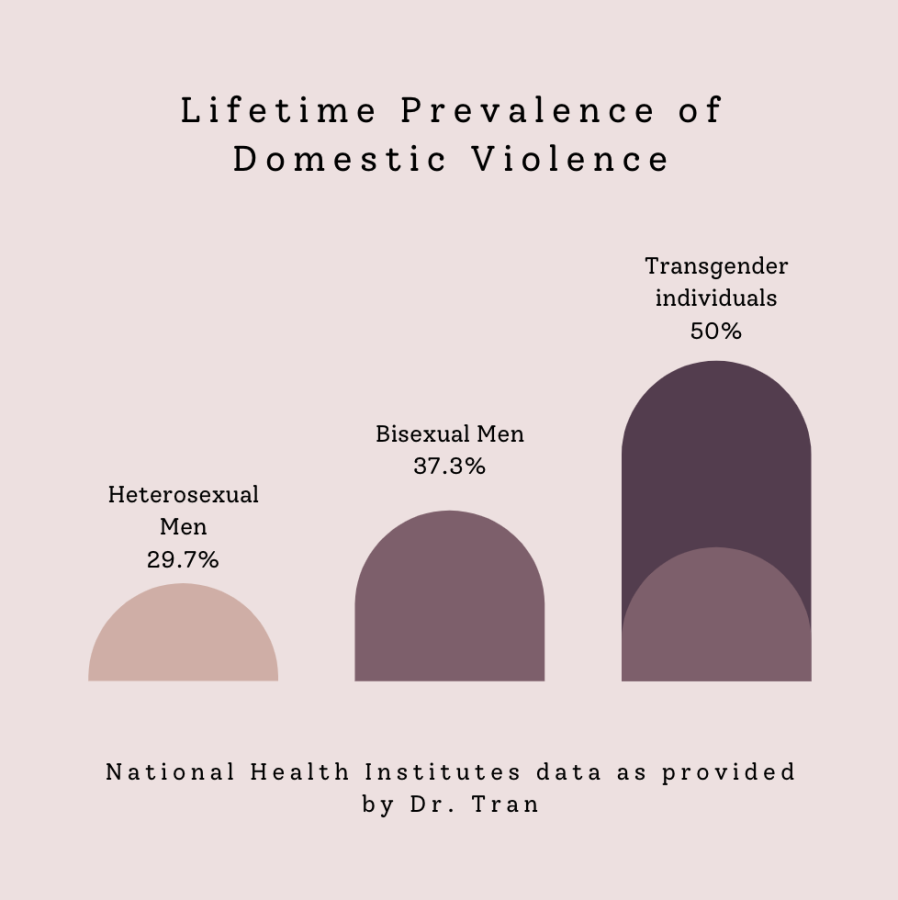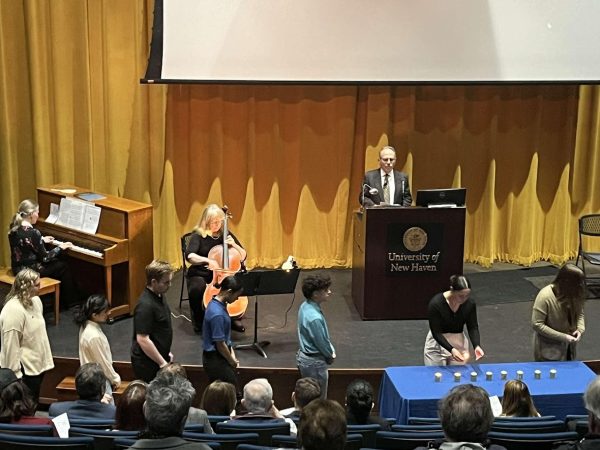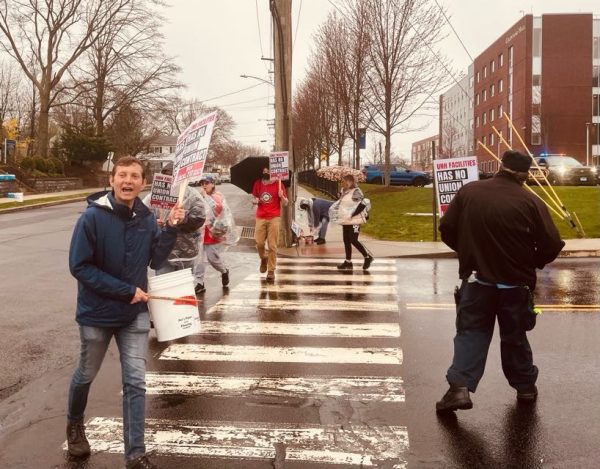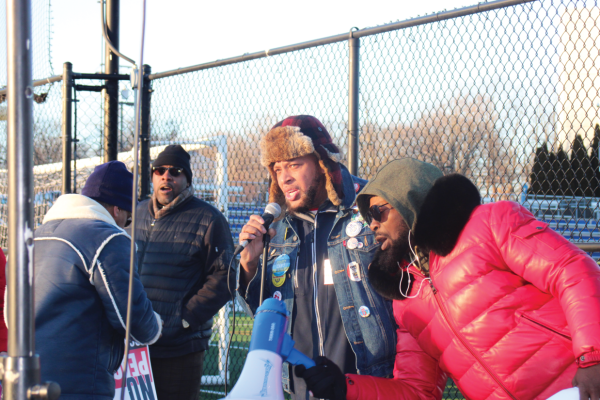Panel discusses domestic violence in marginalized communities
On Oct. 27, the University’s Dean of Students office hosted a panel event on Domestic Violence in Underrepresented Populations, paying homage to October being Domestic Violence Awareness month. The event highlighted the intersectionality of domestic violence cases and the circumstances that can spark this type of abuse.
The program consisted of moderator and Title IX Compliance Director Ashley Dunn along with panelists: Director of the Myatt Center for Diversity and Inclusion Carrie Robinson, Assistant Provost for Diversity, Equity and Inclusion Alvin Tran, Associate Professor of Psychology and Director of the Research and Evaluation Center of Esperanza United Lillie Macias and junior forensic psychology major, Jedi Ambassador and Wellness Peer Educator Mary Lippa.
Accompanied by a supporting presentation, each of the panelists took turns answering questions prompted by both Dunn and the audience.
Macias began the event, and when prompted for a definition of domestic violence, she turned the question on the audience. After the audience listed verbal, physical and emotional abuse, Macias supplemented the list with financial, digital, reproductive and sexual abuse citing that all forms about domestic violence is about imbalance of power and control in a relationship.
Tran supported Macias’ definition, saying, “We immediately associate [domestic violence] with physical violence.”
“We have to realize there are many other forms of violence within the scope of public health,” she said
According to Robinson, while everyone is at risk to be a victim of domestic violence, those in marginalized communities face unique challenges specific to their social stratification such as the threat of being “outed” for their sexuality or gender identity by their partner.
Those in the immigrant community face increased risks of domestic violence and intimate partner violence––a broader term for abuse in relationships not officiated by living situations. This is due to an intersection of risk factors when the community is less likely to report crime on a whole, they are less likely to know of resources available to them and they are more likely to face financial abuse due to wage disparities and cultural expectations.
Through research she conducted with Esperanza Rising, Lippa said that 20% of Latino youth have faced dating violence which is an underestimate due to their decreased reporting rates caused by the stigma surrounding dating violence and asking for help in their family cultures.
While each panelist held an expertise in their field, Tran’s research in LGBTQ+ health disparities allowed him to present some astounding information on the increased risk factors for the community.
He pulled statistics from the National Institutes of Health which found that 37.3% of bisexual men will experience domestic violence in their lifetime compared to 29% of their heterosexual counterparts. These figures are increased for the transgender community as one report found that 30-50% of transgender individuals have experienced domestic violence in their lifetime.
Danielle Cooper, an associate professor of Criminal Justice and audience member, asked the panelists what the future of law enforcement looks like in addressing domestic violence and the various disparities different communities face.
Robinson said that officers need training and education on how to deal with domestic violence cases, especially on how to not victimize marginalized individuals. She said that a large hesitancy of individual to report is a fear that they will be blamed for their victimization, as with the transgender and non-binary community who is commonly accused of “tricking” their partner because of their gender identity.
Macias also said police should work with community partners in responding to cases regarding domestic violence and in how to support survivors. She cited one program where local officers partnered with social workers when responding to sex trafficking incidents in order to better support survivors and reduce the risk of criminalizing and revictimizing them.
To close out the event, Dunn asked each of the panelists to provide the audience with one call to action to combat domestic violence and aid survivors.
Lippa pulled a reference from her honor’s thesis theme of “Anyone can be a perpetrator and anyone can be a victim,” and said that people need to check their “language and biases” when speaking on the subject.
Macias cautioned those who wanted to help individuals in potentially dangerous relationships, saying “A lot of people aren’t ready to leave relationships that aren’t healthy” and as such, people need to check their own biases on situations they see.
Tran said, “You have choices, too. You have options, as well, trying to reach those in the audience that have been or will be impacted.”
Robinson said, “It doesn’t all have to be on you,” expressing the plethora of resources available.
The university has multiple resources for those experiencing domestic violence either directly or indirectly. While faculty and staff are mandated reporters, Counseling and Psychological services, the Milford Crisis Center, Health Services, and University Chaplain Marty O’Conner are all confidential resources who are not compelled to report cases when the individual does not pose a threat to themselves or others.
The National Domestic Violence Hotline can be reached via text by sending START to 88788, over the phone at 1-800-787-3224 and online at thehotline.org.
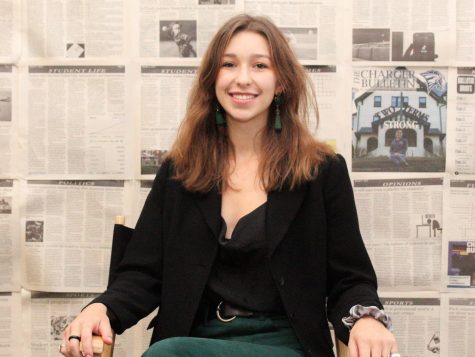
Isabelle Hajek is a senior at the University of New Haven majoring in psychology with a concentration in forensics and a double minor in criminal justice...

